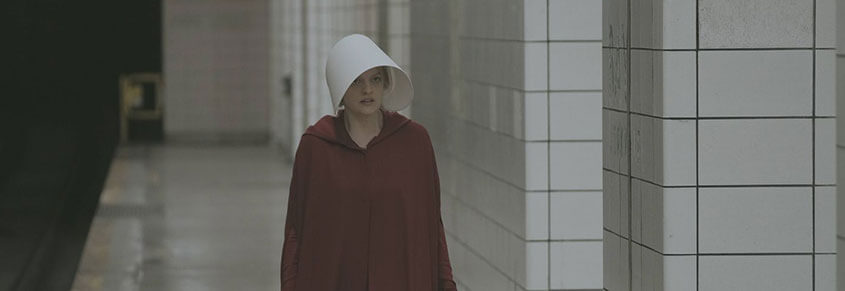This latest episode gives us a deeper sense of what life for women is like in the Republic of Gilead—and sheds insight into Trump’s obsession with building a border around our country.
This article was made possible because of the generous support of DAME members. We urgently need your help to keep publishing. Will you contribute just $5 a month to support our journalism?
Warning spoilers, including non-book spoilers
This week Congress is expected to vote on a budget that will keep the U.S. government functioning until the end of September. Lost in the myriad deviations from President Donald Trump’s initial funding requests was any spending for a border wall between the United States and Mexico. The Trump administration steadily denied that they were rebuked—instead, the president claimed there was more than enough for a down payment, even though the budget bill specifically blocks the funds for being used in that way. After a year of “build the wall!” chants peppering his rallies, the president has decided it is better to continue the façade that a Mexican wall is in the works than admit that he has failed to pass his No. 1 campaign promise.
Why? Because walls are power. And that’s exactly what episode four is all about.
Now that we’ve reached the fourth episode and both the characters and our frightening misogynist theocracy has been carefully established, The Handmaid’s Tale series is able to embellish and deviate more from the book. That gives us not just more of a look into the life of Offred (formerly June) and her partner and child, but also a deeper understanding that life in the Republic of Gilead is brutal not just for Handmaids, but for every woman in the country.
We learn early in the episode that an Aunt has run away and taken sanctuary in Canada, where she has shared details of the new regime and the use of Handmaidens in an interview with the Toronto Star. From the exchange between Serena Joy Waterford and Commander Fred Waterford we don’t just learn that apparently Aunts, too, are unhappy in the new world (despite, as Aunt Lydia has shown us, having far more control than any other women in the Republic), but exactly how diminished even the upper class Commanders’ wives have become. Conversing with the Commander about the runaway Aunt, Serena Joy strategically suggests how the rulers should respond in order to block a potential media frenzy. Commander Waterford, however, brushes her suggestions aside, telling her, “You don’t need to worry about it, we have good men working on it.”
Still there is one place where Serena Joy still has a modicum of power, and that is over Offred. It has been nearly two weeks since Offred informed Serena Joy that she is not pregnant, and the Commander’s wife has kept Offred imprisoned inside her bedroom. “My door is unlocked, it doesn’t even close all the way—a constant reminder of who is in control,” Offred notes as she struggles to keep herself sane while being confined by her four walls.
Being distanced by barriers becomes an ongoing theme of the episode in subtle and not so subtle ways. When Offred is finally allowed outside for a trip to see her physician, she is driven in the Commander’s car, windows covered with handmaiden-red fabric and the window between herself and Nick the driver pointedly closed at the hand of Serena Joy. Inside the doctor’s office, Offred is just as cut off from her physician, who is not allowed to see past the white curtain draped vertically, cutting her body in half and leaving her a faceless torso for him to examine. Walls can only be breached by those who have power, a fact that the doctor shows her as he breaks both official protocol and the sterile white barrier as he offers to have sex with her in order to impregnate her. Offred alone can’t break through anything, something she shows again on the way back from the office, pounding viciously on the car’s glass window in a fit of anger and despair.
But where there are barriers, there will always be people trying to break them down. Much of the episode focuses on Moira, who continues to struggle with the new regime’s ideas of roles for women. Moira looks for ways both large and small to break free, starting with some anti-Aunt bathroom graffiti and a small but deliberate hole through the wall separating two bathroom stalls—a hole just large enough for June and her to touch fingers. Once the Handmaidens learn that they aren’t just acting as surrogates and being artificially inseminated, but instead will be forced into sex with the Commanders, however, Moira grows more desperate and she and June plot their escape from the Center.
By the episode’s end much has changed for Offred, who learns how to harness her own power over the Commander after an unsuccessful Ceremony and a far more successful game of Scrabble where she learns what really happened to the Offred before her. With that new leverage, Offred is able to get herself released from her banishment and outside the house once more—and in the background we see Serena Joy herself now peeking through the window, just as trapped as Offred.
The bedroom, the anonymous drape of sheets in the doctor’s office, the peeling painted bathroom stall—most of these walls were more veneer than substance, easily broached by those with the will to do it. In many ways, Trump’s own proposed border wall is the same concept. It is the ultimate show of power, separating the two countries and controlling who “deserves” to have a shot at the American Dream. Walls are always about control, whether they are constructed of steel and concrete or presidential fantasies and prejudice. And this week’s episode shows that every wall can be broken down.
So, in the words of Offred, “Nolite te bastardes carborundorum, bitches.”
You can watch The Handmaid’s Tail on Hulu
